Posts by Christopher Lochhead
132 Sizing People Up w/ FBI Agent Robin Dreeke
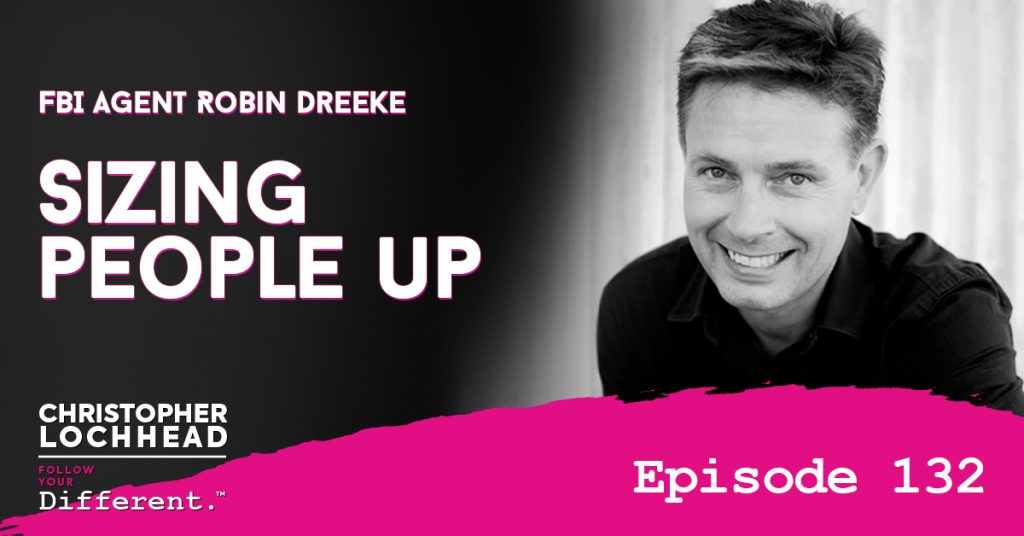
Podcast: Play in new window | Download (Duration: 1:10:20 — 96.8MB) | Embed
Subscribe: Apple Podcasts | Spotify | Pandora | RSS | More
In this episode, we continue our run on legendary authors. We hang out with former Marine, FBI agent and Chief of the FBI Counterintelligence Behavioral Analysis Program, Robin Dreeke.
This guy used to hang out with foreign spies in an effort to get them to turn on their countries and help the US. He’s got some insanely valuable experience in how to communicate, and relate to people.
Detecting Lies
Christopher asked one of the most pressing questions any FBI agent has been asked, ‘how do you detect lying?’ Robin candidly shares “you don’t.” He further shares that even the best people in the world have 50% accuracy when it comes to detecting deception.
Instead, what Robin looks for when speaking to a “subject” are verbal and non-verbal signs of stress.
“I never like to tell someone or think that someone is deceiving or lying, I just think in terms of ‘they don’t have transparency with me.’” – Robin Dreeke
Famous Cop Questions
One of the most famous cop question, as seen in movies, is the suspect’s whereabouts. Robin shared what these cops are looking for is a direct answer.
Robin personally shared his personal guidelines when he is questioning a subject: (1) Seeking thoughts and opinions, (2) Speaking in terms of their priorities, (3) Validating them and (4) Empowering them with choices;
Similarities With Sales
Robin shares that he must have had the hardest sales job in the world. His product is selling American patriotism to foreign diplomats, wherein affiliation is also considered to be illegal.
“From rapport, you build trust. From trust, you get a healthy relationship.” – Robin Dreeke
Other than that, he confirms that his learnings, which he wrote in the book Sizing People Up is highly beneficial to sales or business people in general.
For the part where Robin talks about the real FBI secret for solving crimes, download and listen to this episode.
Bio:
Robin is a best-selling author, professional speaker, trainer, facilitator, and retired FBI Special Agent and Chief of the Counterintelligence Behavioral Analysis Program. Robin has taken his life’s work of recruiting spies and broken down the art of leadership, communication, and relationship building into Five Steps to TRUST and Six Signs of who you can TRUST. Since 2010, Robin has been working with large corporations as well as small companies in every aspect of their business. Whether it is newly promoted leaders, executives, sales teams, or customer relations, Robin has crafted his People Formula for quick results and maximum success.
The Military Leader
Although Robin always aspired to become a great leader, he realized from his time at the United States Naval Academy and in the United States Marine Corps that leadership was much more than just telling people what to do: a great leader uses interpersonal skills to inspire action, rather than demand the compliance of others.
The Spy Catcher
Upon entering service as an FBI Special Agent in 1997, Robin began his journey as a counterintelligence specialist and behaviorist in the agency’s efforts to thwart the efforts of our country’s greatest adversaries. Serving in New York City, Norfolk VA, FBI Headquarters, Quantico VA, and Fredericksburg VA, Robin received advanced training and experience in the area of social psychology and the practical application of the science behind relationship development and trust, ultimately leading the FBI’s elite Behavioral Analysis Program.
The Behavioral Analysis Expert
Robin has built his highly effective tools for all aspects and stages of interpersonal communication and relationship development. Robin has combined all these tools and techniques and created a one-of-a-kind formula for success with people. Today, Robin is a recognized expert, author, and gifted lecturer in the art of interpersonal communication, relationship building and Trust. These skills are used every day in leadership, sales, human resources, and all aspects of life, both business and personal. CBD oil and capsules Hemp oil – H Drop UK H Drop UK
Links:
We hope you enjoyed this episode of Follow Your Different™! Christopher loves hearing from his listeners. Feel free to email him, connect on Facebook, Twitter, Instagram and subscribe on iTunes!
131 How to Build Billion Dollar Startups w/ David Sacks
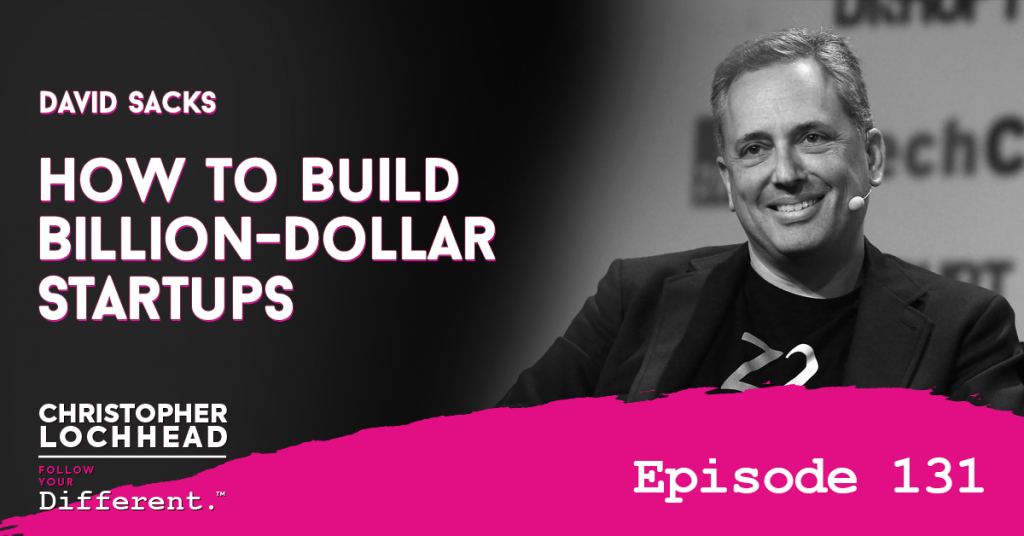
Podcast: Play in new window | Download (Duration: 1:00:03 — 82.7MB) | Embed
Subscribe: Apple Podcasts | Spotify | Pandora | RSS | More
In this episode, we have a real conversation about legendary entrepreneurs and investor David Sacks about how to build billion-dollar startups.
We talk about how startups go off the rails and what is ok and not ok to lose money on. We also touch on why B2C strategies have become powerful for B2B companies and many more! If you’re an executive or an entrepreneur, even if you’re outside of tech, get your pen ready. there’s a ton on this episode!
Legendary VC
We continue our run of legendary VCsc with David Sacks. He was a co-founder of PayPal, Founder, and CEO of Yammer and Founder of Craft Ventures. Some of his investments include Facebook, Uber, SpaceX, Palantir Technologies, Airbnb and Bird
This is another great example of the power of a real dialogue podcast.
“You know the old line of ‘nobody ever got fired for buying IBM’? I think that the modern version of that saying would be ‘no one ever got fired for buying the category leader’ and if you become the category leader, you just get all these sales by default.” – David Sacks
Going Off The Rails
David shares how he witnessed high profile companies going off the rails for several reasons. He noted that aside from product-market fit, there are other mundane reasons why these companies fail. Here’s the big list that could go wrong in high growth companies:
“One is commoditization, the rest of the world catches up the startups innovation. Two, cost of customer acquisition, a bunch of reasons it could happen. Third, margin problem, negative gross margins. Fourth, external dependency. Fifth, leaky bucket, there’s a problem with retaining customers. Sixth, regulatory compliance, then, sales compliance problem, that’s seven. Eight, doing things that don’t scale. Nine would be the founder psychology problem which is pushing things too far and tenth, company culture problem. One the 10.1 mark, macro shock where the company goes out for financing and isn’t able to raise around because of one of the problems I mentioned in them. Everything comes to head and you had a car crash.” – David Sacks
The Challenge for Startups
One of the greatest fears of startups Is commoditization. David says there is always a risk of the competition catching up in terms of software design. He encourages startups that it is a trade-off to make, to move fast enough to maintain market leadership.
“Everyone is running around with their hair on fire but they’re afraid that their innovation gets copied. If you’re not moving fast enough, you’re on a bit of hamster wheel. If you’re not moving fast enough, you’re running in place.” – David Sacks
To hear about David’s thoughts on how to define and dominate a market category, what areas of technology David thinks have the most promise and more, download and listen to this episode.
Bio:
David Sacks is a highly accomplished entrepreneur and investor in internet technology firms.
He is general partner of Craft Ventures, a venture capital fund he co-founded in late 2017. Previously as an entrepreneur, Sacks was the founding COO and product leader of PayPal (acquired by eBay in 2002 for $1.5 billion) and Founder/CEO of Yammer (acquired by Microsoft in 2012 for $1.2 billion).
In 2016, he led the turnaround of Zenefits as interim CEO.
In 2017, Sacks co-founded blockchain startup Harbor as an incubation of Craft Ventures.
His angel investments include Facebook, Uber, SpaceX, Palantir Technologies, Airbnb and Houzz.
Links:
We hope you enjoyed this episode of Follow Your Different™! Christopher loves hearing from his listeners. Feel free to email him, connect on Facebook, Twitter, Instagram and subscribe on iTunes!
030 How To Make Marketing Decisions
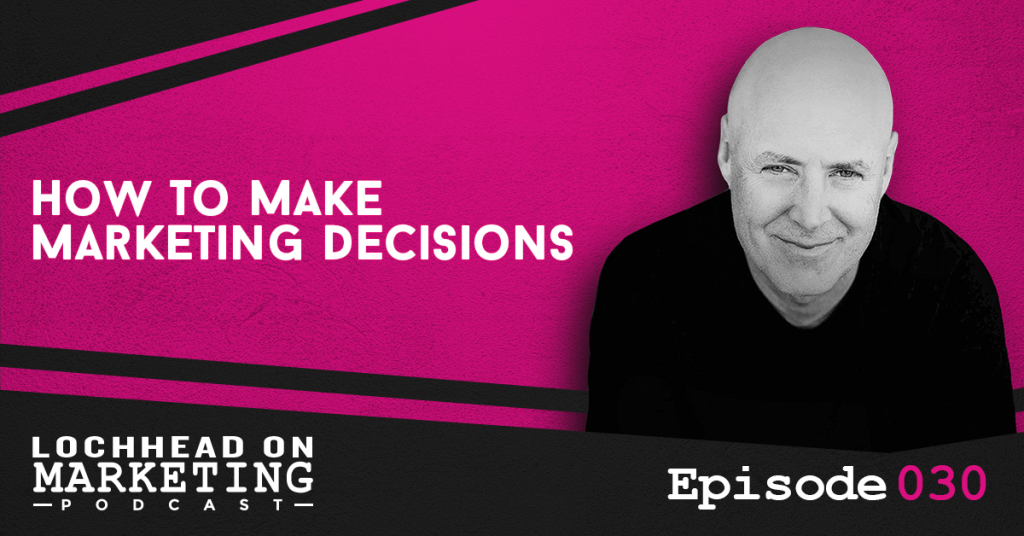
Podcast (lochheadonmarketing): Play in new window | Download (Duration: 7:21 — 10.1MB) | Embed
Subscribe: Apple Podcasts | Spotify | RSS | More
In this episode, let’s talk about the strategic lens required to make marketing decisions.
Marketing Decisions
Marketers, over and over again, continue to make this big mistake: they come up with marketing decisions without having a discussion around its context. Context, in terms of the “lens” they will use to come up with the decision.
“If you’re a regular listener and if you know me, you know one of my favorite expressions is, thinking about thinking is the most important kind of thinking.” – Christopher Lochhead
Overly Simplistic Lens
When people go and make a decision, they have an implied assumption that everyone on their team are on the same page. This holds true in different types of teams, whether its a department or a board room discussion.
In marketing, in particular, people use different kinds of lenses. Christopher points out that most people, even seniors executives, board members or giant public companies, use an overly simplistic lens in making a decision.
“Do I like it or do I not like it? Essentially the same lens that they use for naming a cat.” – Christopher Lochhead
Strategic Thinking
Christopher emphasizes that asking the questions whether you like something or not like something is just the same approach to naming a pet cat. This shouldn’t be done, especially when we’re talking about picking a category or designing a creative campaign or anything in between.
Hence, he is proposing the following lens when coming up with a marketing decision:
1) When you’re looking at any kind of marketing strategy or execution, ask, is this legendary?
2) Does this, execution, strategy or campaign enable us to design and dominate our category?
3) Does this decision drive near both term and long term revenue and customer loyalty?
To hear more about how to make marketing decisions, download and listen to the episode.
Bio:
Christopher Lochhead is a #1 Apple podcaster and #1 Amazon bestselling co-author of books: Niche Down and Play Bigger.
He has been an advisor to over 50 venture-backed startups; a former three-time Silicon Valley public company CMO and an entrepreneur.
Furthermore, he has been called “one of the best minds in marketing” by The Marketing Journal, a “Human Exclamation Point” by Fast Company, a “quasar” by NBA legend Bill Walton and “off-putting to some” by The Economist.
In addition, he served as a chief marketing officer of software juggernaut Mercury Interactive. Hewlett-Packard acquired the company in 2006, for $4.5 billion.
He also co-founded the marketing consulting firm LOCHHEAD; was the founding CMO of Internet consulting firm Scient, and served as head of marketing at the CRM software firm Vantive.
We hope you enjoyed this episode of Lochhead on Marketing™! Christopher loves hearing from his listeners. Feel free to email him, connect on Facebook, Twitter, Instagram and subscribe on iTunes! You may also subscribe to his newsletter, The Difference, for some amazing content.
130 Grumpy Old Geek Jason DeFillippo
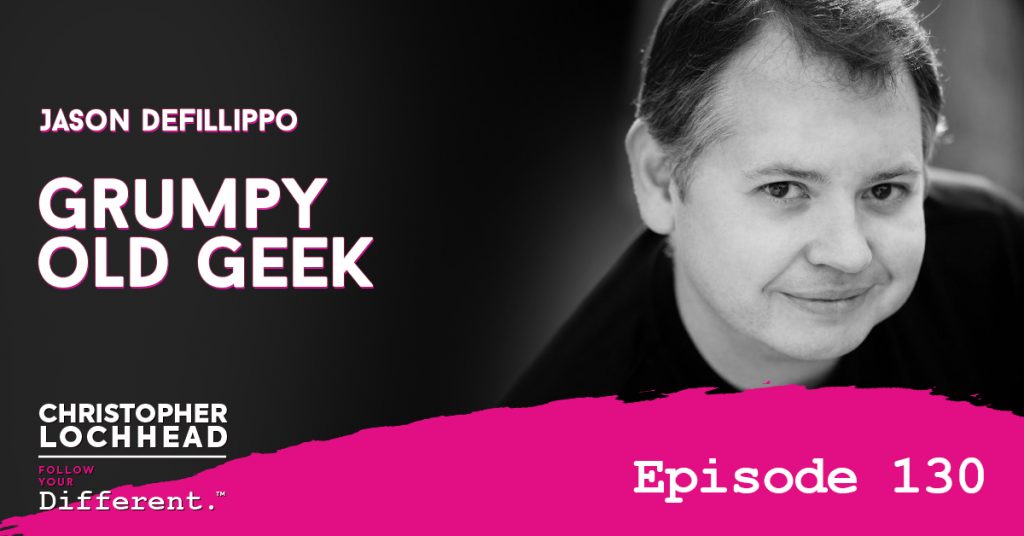
Podcast: Play in new window | Download (Duration: 49:40 — 68.4MB) | Embed
Subscribe: Apple Podcasts | Spotify | Pandora | RSS | More
He’s back! Podcast legend and co-host of Grumpy Old Geeks podcast, Jason DeFillippo joins us for another dynamic conversation about deep fakes, streaming services, and tech that will or will not change your life in 2020.
Deep Fakes and Video Editing
Undeniably Christopher’s favorite topic with Jason, they talk about deep fakes and astounding editing to produce fake news. Christopher cites a Forbes article about CNN Reporter Jim Acosta allegedly pushing a White House intern.
“It was edited to remove 2-3 frames of the film, to speed up, when he pushed the person and they removed the ‘pardon me, ma’am’ out of the audio. That was just creative editing.” – Jason DeFellippo
Moreover, there was also another video circulating the interwebs that make it look like Sarah Sanders was intoxicated in public. It doesn’t end there because they also talk about Gal Gadot, the most recent actor to play WonderWoman, who apparently appeared in a porn video. Clearly another deep fake.
Have You Heard About “Hearables?”
Apparently, hearables are the new category king and queen for 2020 as different brands introduced a “smart” earbuds. Although Christopher is a fan of the attempt to create a new category, Jason says the products really mean nothing.
“That’s the thing, they’re not smart. They are just conduit to your phone. If you go out without your phone, they don’t work. they get real dumb, real fast.” – Jason DeFellippo
Aside from this, Jason rants about adding more gadgets to charge. He says he has 7 gadgets at the moment and he would prefer using wired earphones/plugs due to the sound quality.
The Field of Streams
Jason shares that around 7 years ago, on his podcast Grumpy Old Geeks, they have predicted this will happen. Everybody saw the popularity of Netflix and all the content creators decided they should make their own platforms.
“I think we’re going to see consolidation coming. People are going to start doing deals with each other to get bundling packages.” – Jason DeFellippo
Jason also predicted that households would just pay for around 3 streaming service, max.
To hear more information about Jason DeFellippo and to listen to more of his comments on deep fakes, tech for 2020 and streaming services, download and listen to the episode.
Bio:
Jason is a full-time podcast producer and editor for The Jordan Harbinger Show as well as the Creator and Co-host of the Grumpy Old Geeks Podcast.
Jason has been building websites since the early days in 1994 for clients that range from small businesses to million dollar websites for blockbuster films to his own start-ups.
In 1994 he created the groundbreaking website Spewww which was nominated for a Webby in the first year the awards were held in 1998.
In 1995 a new media company in Santa Monica moved him out to Los Angeles to build the first website for Epson America.
Since then Jason has launched over 250 websites for major corporations like Paramount Pictures, Sony, Warner Brothers, and Disney.
He also created the two time SXSW Weblog Award-winning Blogrolling service as well as co-founded the global blog network Metroblogging.
He has worked at several startups in San Francisco including Technorati and 8020 Media, the publishers of JPGMagazine.com, and statistical aggregator Metricly.
Links:
Some of the topics covered:
It’s All Fun And Games Until Someone Gets Hurt: The Implications Of Deepfakes
Tech That Will Change Your Life in 2020
The future is ear: Why “hearables” are finally tech’s next big thing
The Great Streaming Battle Is Here. No One Is Safe
We hope you enjoyed this episode of Follow Your Different™! Christopher loves hearing from his listeners. Feel free to email him, connect on Facebook, Twitter, Instagram and subscribe on iTunes!
029 Disagree and Commit
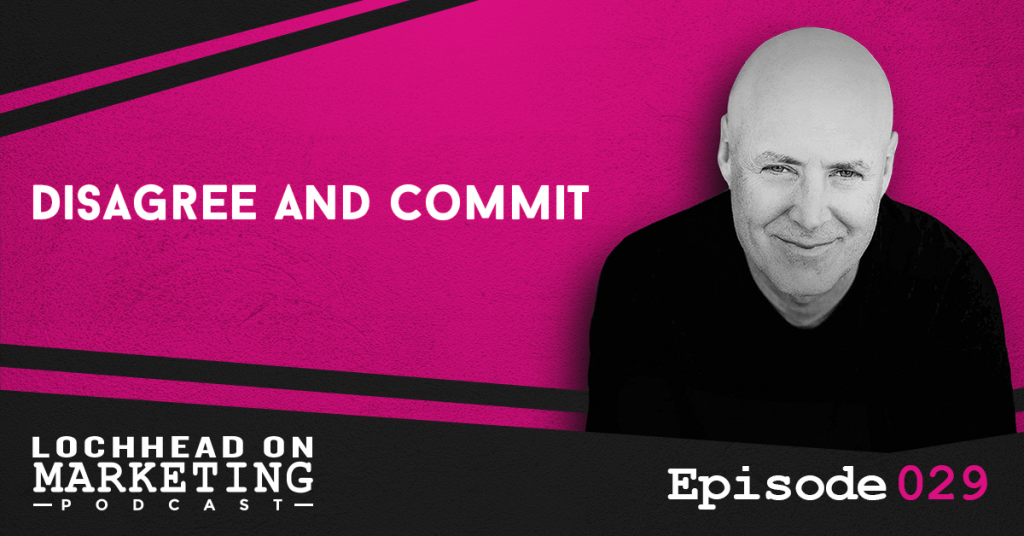
Podcast (lochheadonmarketing): Play in new window | Download (Duration: 10:06 — 13.9MB) | Embed
Subscribe: Apple Podcasts | Spotify | RSS | More
Every big decision involves a group of people.and so, in business, if you’re going to do something legendary, whether its a strategy or a campaign, it will be a group decision.
In this episode, Christopher Lochhead shares why it is a legendary business trait to be able to get people to disagree and commit.
Everybody has a Marketing Opinion
Recently, Christopher had a discussion on with legendary tech executive Elisa Steele on Follow Your Different Episode 129. She talks about the power of being able to disagree and commit. She also talks about the importance of being a consensus builder.
“Getting people to disagree and commit is one of the most important skills an executive can have. Why? Because everyone has a Marketing Opinion.” – Christopher Lochhead
CMO’s get a lot of “HELP” from internal stakeholders. Debate, discussion, and disagreement are GOOD, when you are working on strategies, creative ideas, campaign ideas or category design. However, consensus is BAD.
“If everyone agrees, by definition it sucks. If someone isn’t scared, upset or at least concerned, it’s probably not legendary.” – Christopher Lochhead
How Do You Get In Front of This
Christopher advises that from the 1st meeting, tell the people involved the following:
1) we want to do something legendary
2) we want to generate legendary ideas/creative “ideation stage”
3) and when we decide, we are going to execute like “a pack of speedy, crazed wolverines:”
It is essential to lay upfront during the first meeting that the objective is not to please everybody but to create a strategic desition that will reap legendary results. It is also important to address who is the final decision maker.
Strategic Decision Over Consensus
Addressing these concerns from the very beginning will definitely receive negative responses from a lot of people, including some board members or senior executives. Christopher says that “this is okay.” We are aiming for strategic decisions, not consensus.
It would be nice to acknowledge that businesses need “feedback.” However, it would also be better to get everyone’s commitment that they will support and execute the final strategic decision. Be firm on expecting everybody to commit, even if they hate the decision or the direction taken. This trait would separate legendary leaders from the ordinary ones.
To hear more about why it is a legendary trait to learn how to disagree and commit, download and listen to the episode.
Bio:
Christopher Lochhead is a #1 Apple podcaster and #1 Amazon bestselling co-author of books: Niche Down and Play Bigger.
He has been an advisor to over 50 venture-backed startups; a former three-time Silicon Valley public company CMO and an entrepreneur.
Furthermore, he has been called “one of the best minds in marketing” by The Marketing Journal, a “Human Exclamation Point” by Fast Company, a “quasar” by NBA legend Bill Walton and “off-putting to some” by The Economist.
In addition, he served as a chief marketing officer of software juggernaut Mercury Interactive. Hewlett-Packard acquired the company in 2006, for $4.5 billion.
He also co-founded the marketing consulting firm LOCHHEAD; was the founding CMO of Internet consulting firm Scient, and served as head of marketing at the CRM software firm Vantive.
We hope you enjoyed this episode of Lochhead on Marketing™! Christopher loves hearing from his listeners. Feel free to email him, connect on Facebook, Twitter, Instagram and subscribe on iTunes! You may also subscribe to his newsletter, The Difference, for some amazing content.
129 How to go from Sales Rep to Chairman of The Board in Silicon Valley w/ Elisa Steele
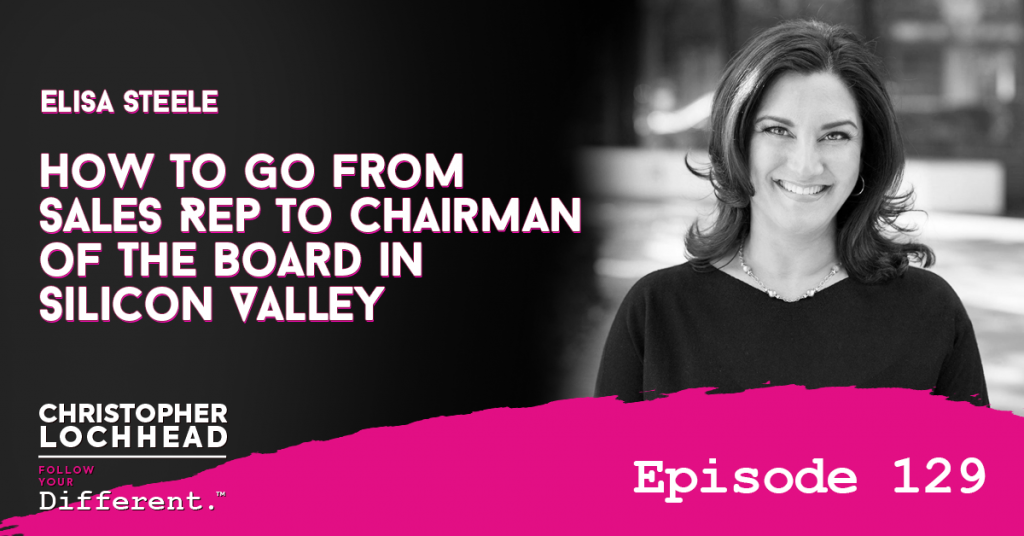
Podcast: Play in new window | Download (Duration: 56:48 — 78.2MB) | Embed
Subscribe: Apple Podcasts | Spotify | Pandora | RSS | More
In this episode, we are taken for a ride on how to go from sales rep to Chairman of the board with the amazing Elisa Steele. We have a powerful conversation about how she went from sales rep to regional sales to CMO, then CEO.
We also talk about what she’s learned from working in massive tech companies like Microsoft and Yahoo and many more, Wait for the part where she gives advice on how women can design legendary careers and have children too.
From Sales Rep to CEO
Elisa Steels is the Chairman of the board of two publicly traded tech companies, Cornerstone on Demand and Namley. She’s also on the Board of $25B Splunk. More of her career background includes former CEO of Namley and Jive and former CMO of Skype, and Yahoo.
She candidly shares what she learned from her career in these huge tech companies and from smaller entrepreneurial companies. From the time she graduated, she had a clear vision of what success looks like and she believes she will achieve it through sales.
“If I went into sales, then its really clear. If I’m successful, I made or overachieve my number. Nobody can be subjective about that. If I go into some of these other fields, that was like, a complete mystery to me, how do I know if I am actually gonna make it? – Elisa Steele
Legendary Career Woman
Initially, Elisa shares the only one thing she wished for her career: to not work with other people. The second thing she wished was to have financial independence. She believes that if women do not build resources for themselves, the critical decisions will be left to other people other than themselves.
“I was motivated by the fact or maybe even terrified by the fact that I wouldn’t have choices in life if I didn’t have resources. If you don’t have resources, then decisions in your life are up to somebody else. Resources equals choice.” – Elisa Steele
For Elisa, resources generally are assets. It is representative of the things that help women make a decision on what they want to do. Creating some wealth will make those choices, especially those that are critical in life.
How to Disagree and Commit
Elisa is a powerful executive and she shares the thought of disagreeing, but still committing. She describes herself as a consensus builder.
“Being the smartest in the room doesn’t actually help anybody. You have to actually make decisions and together, execute, because strategy is nothing without strong execution. Executiion is everything. Even if the strategy is off, you can still win, if you execute. Disagree but commit and be one team.” – Elisa Steele
To hear more information about Elisa Steele and to listen to his tips on how to go from sales rep to chairman of the board, download and listen to the episode.
Bio:
Elisa Steele is the Chairman of the Board at Cornerstone (CSOD) and Namely; Board Director at Splunk (SPLK) and an advisor to Advisor to Tile and people.ai.
She’s the former CEO of Namely and Jive Software, Inc.,
Ms. Steele served as Chief Marketing Officer and Corporate Vice President, Consumer Apps & Services at Microsoft Corporation, a worldwide provider of software, services and solutions, and Chief Marketing Officer of Skype, an Internet communications company, from 2012-2014.
Ms. Steele also has held executive leadership positions Yahoo! Inc. and NetApp, Inc.
Ms. Steele has served as a member of the board of directors of Cornerstone OnDemand, Inc., a learning and human capital management software company, since 2018.
Ms. Steele holds a B.S. from the University of New Hampshire and an M.B.A. from San Francisco State University.
Links:
We hope you enjoyed this episode of Follow Your Different™! Christopher loves hearing from his listeners. Feel free to email him, connect on Facebook, Twitter, Instagram and subscribe on iTunes! Get amazing, different stories on business, marketing, and life. Subscribe to our newsletter The Difference.
028 Is Your Marketing Plan Radical Enough?
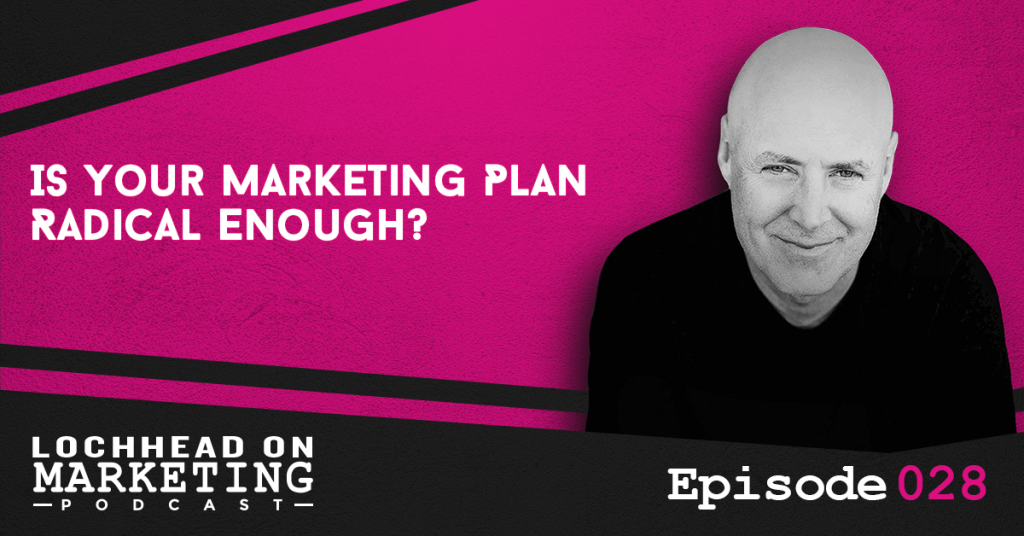
Podcast (lochheadonmarketing): Play in new window | Download (Duration: 13:53 — 19.1MB) | Embed
Subscribe: Apple Podcasts | Spotify | RSS | More
In this episode, Christopher Lochhead asks the question, “is your marketing plan radical enough?” Most marketing plans are predictable, uncreative and safe. He will share today how to do away with your usual marketing plan and craft a radical one.
3x CMO
Being an advisor to a lot of companies, Christopher shares how he has been part of creating, reviewing and critiquing a lot of these companies’ marketing plans. He further says that there are three things about these marketing plans: they are predictable, uncreative and safe.
Safe as in, most CMOs are more concerned with making their “internal customers” happy. The reason behind this is that most CMOs are trying to keep their jobs. Ultimately, this ends up in mundane marketing plans.
“The longer I do this, the more I think that, if it’s legendary, its probably radical, at least in some way.” – Christopher Lochhead
3 Ideas For Radical Thinking
Our job, ultimately in business is to be a leader, who enables our company to design and dominate a giant category that matters. The goal is to earn 2/3rds of the economics in a space that we created.
“That in my opinion that, is the real job of the CMO, CEO and the entire C-suite. So I urge you when building or evaluating a marketing plan, ask yourself: Will this plan enable us to design and dominate a giant category that matters?” – Christopher Lochhead
The second idea is that, do we have a radical way to evangelize our category POV?
Legends market the category, not the brand but this is one of the common mistakes marketing leaders make.
“You want them to buy into the thinking and to the language. and as they do that, they’ll see things the way you do and your new way or different way of doing things will become the defacto standard. What you’re really creating is this fear of missing out” – Christopher Lochhead
Lastly, ask yourself: what’s a radical way to generate leads and drive revenue? Legendary CMOs design the category for the mid-long term and drive revenue in the “ASAP, right now” term.
3 Questions
Again, to recap, here are the three radical ideas to consider before creating a marketing plan.
1) Will this plan, enable us to design and dominate a giant category that matters?
2) Do we have a radical way to evangelize our category POV?
3) What’s a radical way to generate leads and drive revenue?
To hear more about creating a radical marketing plan, download and listen to the episode.
Bio:
Christopher Lochhead is a #1 Apple podcaster and #1 Amazon bestselling co-author of books: Niche Down and Play Bigger.
He has been an advisor to over 50 venture-backed startups; a former three-time Silicon Valley public company CMO and an entrepreneur.
Furthermore, he has been called “one of the best minds in marketing” by The Marketing Journal, a “Human Exclamation Point” by Fast Company, a “quasar” by NBA legend Bill Walton and “off-putting to some” by The Economist.
In addition, he served as a chief marketing officer of software juggernaut Mercury Interactive. Hewlett-Packard acquired the company in 2006, for $4.5 billion.
He also co-founded the marketing consulting firm LOCHHEAD; was the founding CMO of Internet consulting firm Scient, and served as head of marketing at the CRM software firm Vantive.
We hope you enjoyed this episode of Lochhead on Marketing™! Christopher loves hearing from his listeners. Feel free to email him, connect on Facebook, Twitter, Instagram and subscribe on iTunes! You may also subscribe to his newsletter, The Difference, for some amazing content.
128 Human Behavior & Loving People with Different Abilities w/ Dr. Sean Peterson
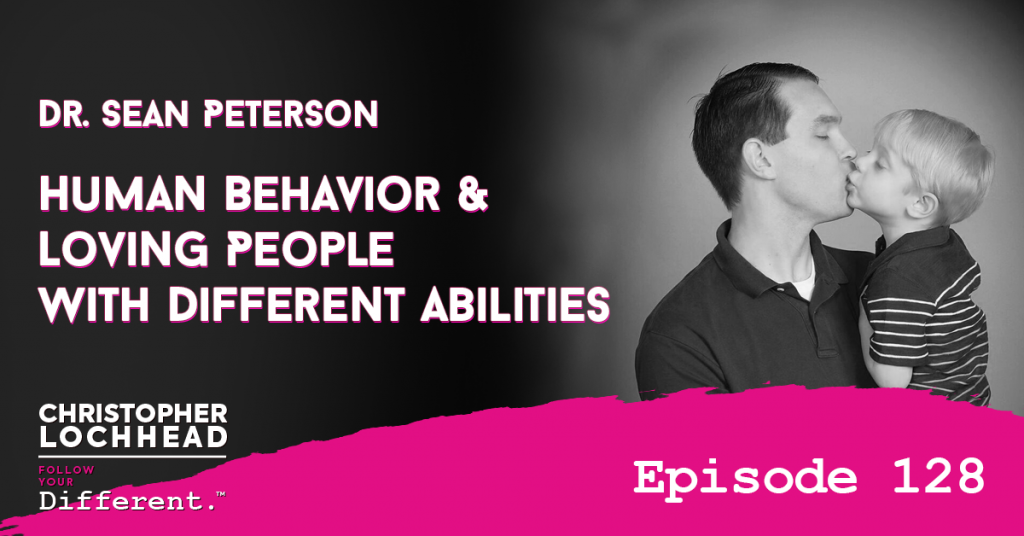
Podcast: Play in new window | Download (Duration: 1:00:45 — 83.6MB) | Embed
Subscribe: Apple Podcasts | Spotify | Pandora | RSS | More
This dialogue is a glimpse into a legend— whose name might not be world-renown but surely is worth getting to know—Dr. Sean Peterson. We connected over our love of people and children who are, “differently-abled. We talk about autism, uniqueness, human behavior and more.
Love For Kids
We’re at a point where every guest we have on could be someone famous. But just because someone’s well known, doesn’t mean you can have a real-life affirming conversation with them.
Today, Christopher converses with Dr. Sean Peterson. Dr. Sean has a Phd. in Applied Behavior Analysis and has spent 10 years running an autism clinic. He’s a wonderful guy, a husband and father. He also runs a physical therapy clinic with his wife called FYZICAL.
“I think people are wonderful in general but working with kids in particular, is amazing. the delight that they have in their eyes, the ability to just make me laugh about ridiculous things.” – Dr. Sean Peterson
What is Autism?
Dr. Sean defines autism as “a neurodevelopmental disorder. He acknowledges that everyone, doctors and parents alike, needs a lot more to understand autism, but on the most basic level, it is categorized by repetitive behavior and social deficit.
“A lot of that social deficit comes in the form of communication deficit. In particular, being able to communicate basic wants and needs and also being able to interpret the feedback that is given back.” – Dr. Sean Peterson
Functional Behaviors
As a behavioral analyst, Dr. Sean shares his point of view on why humans behave such way. It is basically categorized into four: access to attention, access to tangible items, escape from unpleasant situations and access to sensory input or automatic reinforcement He further cites examples of how to identify each one.
“Everybody is unique. Follow your different right? So, its really finding that specific piece for each kid and so from a behavior analyst standpoint, from an applied behavior analysis perspective, our goal is really to teach functional replacement behaviors and skill acquisition.” – Dr. Sean Peterson
He further shares that behavior is functional. Everything we do has a functional outcome and the same behavior could actually bring us different things.
To hear more information about Dr. Sean Peterson and to learn more about human behavior and loving differently abled kids, download and listen to the episode.
Bio:
Originally, from outside of Los Angeles, CA, Sean spent his college years at TCU down in Ft. Worth, TX.
During his time in Ft. Worth, Sean spent 4 years as TCU’s Mascot, SuperFrog!
He also had the privilege of cycling across the United States to raise money for individuals with disabilities.
After finishing at TCU, Sean went on to complete his PHD in Applied Behavior Analysis at the University of Nebraska Medical Center.
He moved his young family to Sioux City, IA, where he was the first clinical director of the Pier Center for Autism.
When Sean and Lauren began to consider a move to be closer to family, Oklahoma City was the perfect choice.
Sean and his wife Lauren have a passion for evidence based medical care and opened FYZICAL Therapy & Balance Centers of Oklahoma City to provide physical therapy focused on Pelvic Health, and Balance and Falls Prevention.
It is with Lauren’s physical therapy knowledge and passion that FYZICAL has grown, and is helping the people of OKC Love Their Lives!
Links:
We hope you enjoyed this episode of Follow Your Different™! Christopher loves hearing from his listeners. Feel free to email him, connect on Facebook, Twitter, Instagram and subscribe on iTunes! Get amazing, different stories on business, marketing, and life. Subscribe to our newsletter The Difference.
127 How To Get & Stay Fit w/ Joey Wolfe
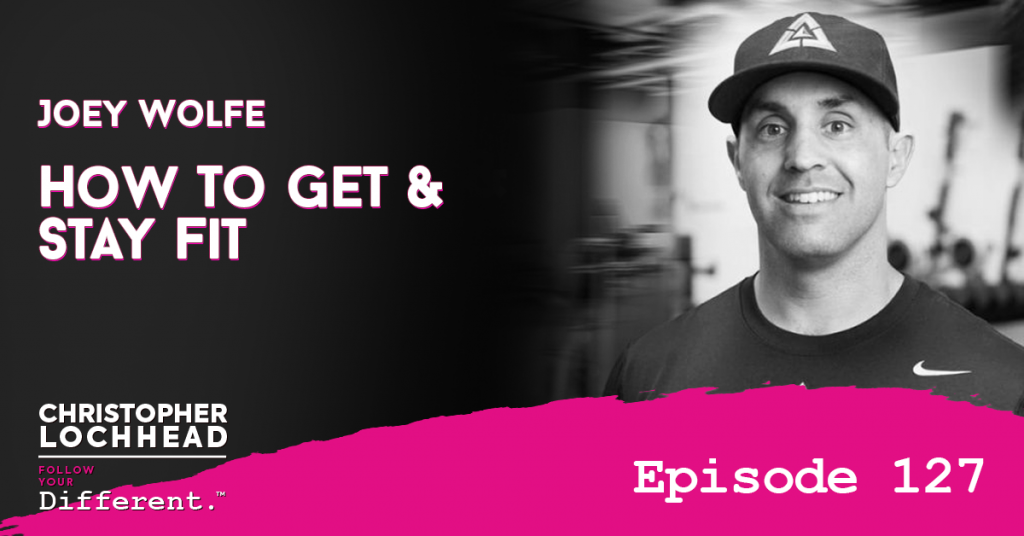
Podcast: Play in new window | Download (Duration: 52:10 — 71.8MB) | Embed
Subscribe: Apple Podcasts | Spotify | Pandora | RSS | More
For our first episode this year 2020, we hang out with professional athlete fitness trainer and founder of Paradigm Sport in Santa Cruz, CA, Joey Wolfe.
Today we go beyond all of 7-minute abs BS, get fit quick, scams and shams and have a real, different conversation about making fitness and wellness stick in your life.
Trainer of Champions and Weekend Warriors
The last time Joey Wolfe had a conversation with Christopher was a year ago. Joey’s episode remains one of our most popular ever. We’re definitely sure, listeners will get practical ideas for well-being improvement,
He has trained superstar athletes like Mitch Haniger of the Seattle Mariners. Additionally, he has worked with former UFC champion Luke Rockhold. World Surf League rookie of the year Nat Young and a lot of regular weekend warrior type like us have trained with him.
“We all know what to do. We all know that going and exercising in the gym for a min of 30 min is a good thing. But for a lot of people, there’s something preventing them from doing that. So just try to get clear on what their motivating factor is” – Joey Wolfe
New Year’s Resolutions and Diet Crazes
One of the reasons why people hit the gym is its part of their New Year’s resolution. Joey says that although it is a good reason, it doesn’t qualify as a great one as it cannot s sustain through the rest of the years.
“Just getting clear what their goals are and then, really trying to start off easy with their habit change. Trying to get them to do something that I know they’re gonna be successful with.” – Joey Wolfe
He also shares how he tried intermittent fasting, keto, paleo diet, vegan, blood typing diet and what works faster, what works slower and what doesn’t work at all.
“Try to educate yourself on this stuff and then try it. Everybody is different. There are polarizing ideas in terms of what’s right and even someone like me in the health and fitness profession, its hard to know what’s right.” – Joey Wolfe
Recommendations and What Nots
Christopher loves Joey’s POV that everyone is an athlete. We all have an athlete inside us. Designing a legendary life entails being active, fit and healthy. With this said, he shares how athletes and weekend warriors alike can follow the same set of principles for fitness and health.
Joey shares adding more habits is better than removing some. He says there is science behind developing habits. For example, it is better to drink more water, take more protein, add more supplements, among others, rather than cutting down sugar and carbs.
To hear more information about Joey Wolfe and to listen to his tips on how to get and stay fit,, download and listen to the episode.
Bio:
Joey is a lifelong athlete. He is the founder and CEO of Paradigm Sport, located in Santa Cruz, CA
Early in his career he played professional baseball and was on track to be a major league catcher when injures took him out.
Never a quitter, Joey dedicated his life to empowering others to be fit, healthy and make their athletic dreams come true.
He’s trained countless pro-baseball players, UFC fighters, pro-surfers and regular folks who want to take their game up in life.
A native of the Central Coast of California, his talent and passion for baseball took him to the professional level where he worked with some of the country’s best trainers. As an ACSM-certified trainer he now shares his experience and enthusiasm with world-class athletes and fitness clients alike.
Joey has built a business with the goal of bringing the most advanced techniques and the highest levels of individualized athlete training to the Central Coast community.
The local environment has shaped his interests and defined sport-specific training in two disciplines: competitive surfing, for which Santa Cruz is world-renowned; and baseball, which launched his career.
Links:
We hope you enjoyed this episode of Follow Your Different™! Christopher loves hearing from his listeners. Feel free to email him, connect on Facebook, Twitter, Instagram and subscribe on iTunes! Get amazing, different stories on business, marketing, and life. Subscribe to our newsletter The Difference.

